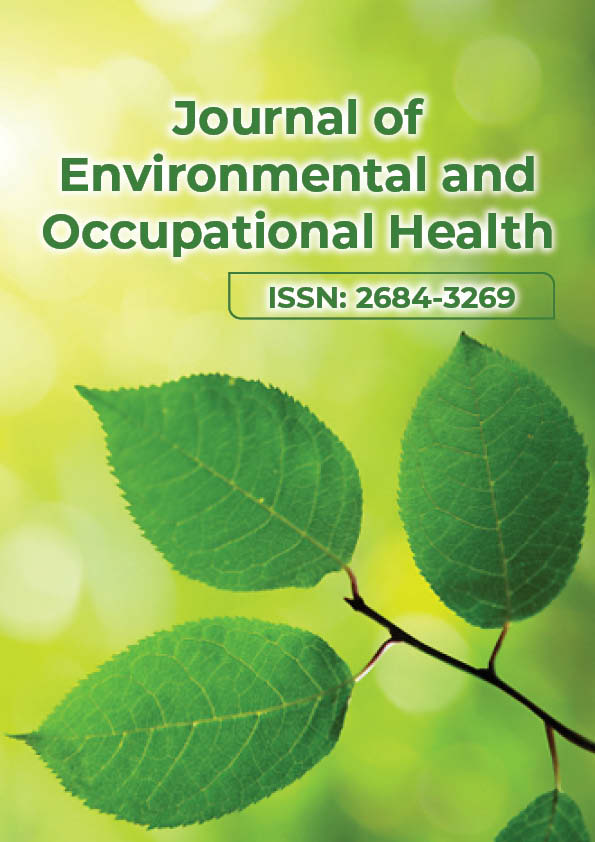Commentary - Journal of Environmental and Occupational Health (2023)
Symptoms and Signs Loss of Hearing Caused by Noise
Van Emmerik*Van Emmerik, Department of Life Science, Jacobs University Bremen, Bremen, Germany, Email: emmerik48@yahoo.com
Received: 30-Dec-2022, Manuscript No. JENVOH-23-89734; Editor assigned: 03-Jan-2023, Pre QC No. JENVOH-23-89734 (PQ); Reviewed: 17-Jan-2023, QC No. JENVOH-23-89734; Revised: 24-Jan-2023, Manuscript No. JENVOH-23-89734 (R); Published: 31-Jan-2023
Description
Hearing loss brought on by loud noises is known as noise-induced hearing loss. Individuals may lose their ability to perceive a specific frequency range or have poor hearing, including increased sensitivity to sound or ringing in the ears. Occupational hearing loss is the term used to describe hearing loss caused by exposure to workplace dangers like noise. Hearing loss can occur gradually as a result of long-term, repetitive noise exposure or quickly as a result of exposure to impulse noise, which is a brief, intense noise. In both cases, loud noise overstimulates sensitive hearing cells, causing irreversible damage or cell death. Hearing in humans cannot be recovered after being lost in this way. There are numerous preventive measures that can be taken to halt or slow hearing loss. The effects of excessive noise can be lessened by reducing the loudness of sound at its source, limiting the amount of time exposed, and using physical protection. Hearing loss can be treated using aids and effective communication techniques if it cannot be prevented. The main cause of Noise-Induced Hearing Loss (NIHL) has been occupational exposures, although it can also be brought on by hazardous recreational, domestic, social, and military service-related noise exposures. According to estimates, 15% of young people are exposed to enough recreational noise to result in NIHL. Hearing loss can be brought on by exposure to sound levels that are abnormally high from any source over time, not just a select group of noise sources.
Signs and symptoms
A conversation in a noisy environment may be difficult to hear as the initial sign of NIHL. Speech perception is impacted by hearing loss in two different ways. The first element is the reduction in audibility, which can be perceived as a loudness reduction overall. Current hearing aids use amplification to make up for this loss. Due to selective frequency loss, the second component is referred to as “distortion” or “clarity loss.” Consonants often experience the effects first because of their increased frequency. For instance, the sounds “s” and “t” might be challenging to hear for those who have hearing loss, which can impair speech clarity. One or both ears may be impacted by NIHL. The capacity to localise sound is impacted by directional hearing issues brought on by unilateral hearing loss.
Tinnitus
Tinnitus is defined as hearing a sound when there is no external sound. High-pitched tinnitus can result from noise-induced hearing loss. About 16 million of the estimated 50 million Americans who experience tinnitus in one or both ears have symptoms severe enough to warrant a visit to the doctor or a hearing expert. Up to 2 million people can no longer perform their daily tasks due to the constant ringing, hissing, chirping, clicking, whooshing, or shrieking. Tinnitus is the most common cause of disability claims in the military, closely followed by hearing loss. Post-traumatic stress disorder, which can both cause and aggravate tinnitus, is the third most common type.
Negative impacts
The detrimental effects of NIHL on a person’s capacity for reciprocal communication, social interaction, and society are mostly undetectable. Hearing loss, in general, affects more than just volume. People may have trouble comprehending what is said over the phone, when multiple people are speaking at once, in a big room, or when the speaker’s face is hidden. Hence, difficult social interactions may result in reduced self-esteem, humiliation, and dread. Those who have hearing loss or impairment sooner in life, as opposed to later in life when it is more socially acceptable, may feel this more keenly. Regardless of age, such psychological conditions can result in social isolation, which is known to have a bad impact on one’s general health and wellbeing. Depression may result from the cumulative effects, especially if tinnitus is brought on by hearing loss. According to research, those who have hearing loss or disability may be more susceptible to a decline in quality of life, as Helen Keller famously said: “Blindness cuts us off from things, but deafness cuts us off from people.”
Copyright: © 2023 The Authors. This is an open access article under the terms of the Creative Commons Attribution NonCommercial ShareAlike 4.0 (https://creativecommons.org/licenses/by-nc-sa/4.0/). This is an open access article distributed under the terms of the Creative Commons Attribution License, which permits unrestricted use, distribution, and reproduction in any medium, provided the original work is properly cited.





